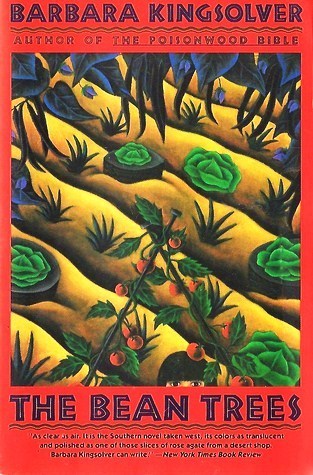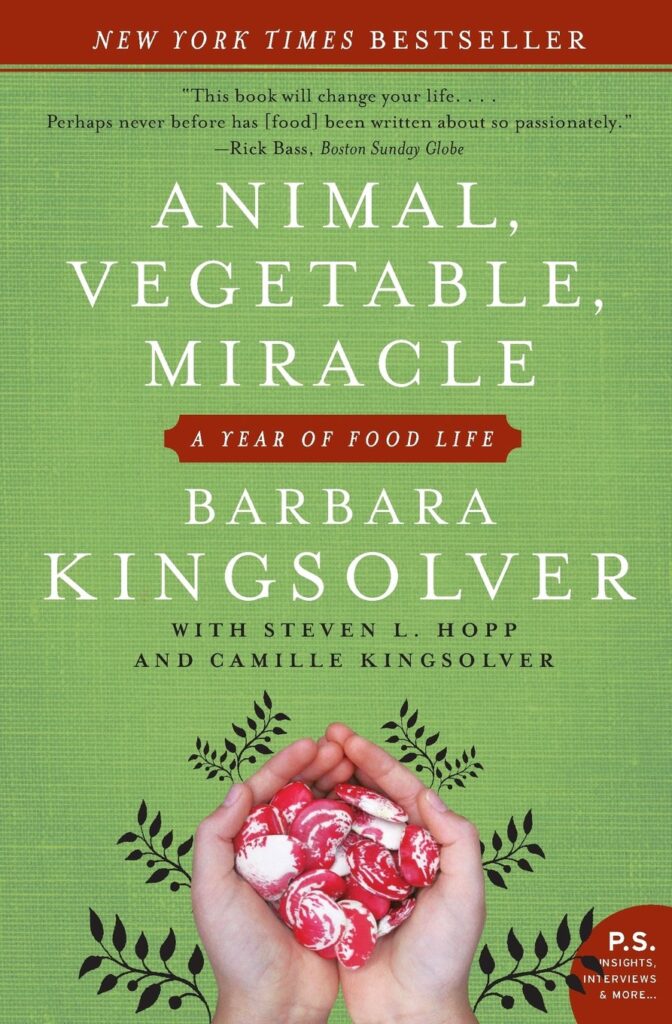Barbara Kingsolver
It’s been a moment — my apologies.
I am reading, or rather trying to read, three different books and none of them have grabbed me as yet. And so I flip around from tome to tome hoping to settle into a groove, but so far, nothing. I am not alarmed, this happens sometimes and I know my reading will turn a corner.
In the meantime, a friend and Book Barmy follower asked me about Barbara Kingsolver and had I read her latest, award-winning novel, Demon Copperhead? Alas, I had to reply no, but explained Ms. Kingsolver is is one of my favorite authors. This intrepid reader asked, then why no reviews of her books on your blog?
Say what? I scrolled and searched this blog top to bottom and, she was right, nothing about Ms. Kingsolver anywhere! It’s time to correct this oversight right now.
The Bean Trees
This is Ms. Kingsolver’s debut novel which I read when first published way back in 1988, but its story is still clear in my mind. The Bean Trees tells the story of an improbable heroine named Marietta Greer. Marietta grew up being raised by a single mother in a small town in Kentucky. After high school and working in the town’s small hospital for 5 years, Marietta decides to take a road trip with an eye to settling somewhere else. Along the way, she stops at a diner for dinner. Coming out to her car afterwards, she finds a native American baby wrapped up in a blanket placed on her car seat. The baby’s aunt talks tearfully with her, begging Marietta to take the baby. The baby’s mother is dead and the father seems threatening. Under these circumstances, Marietta reluctantly accepts the baby and drives away. She names the child Turtle and gives herself a new name as well (Taylor).
Together they travel to the outskirts of Tucson, where her car breaks down and they find themselves at an auto repair shop called Jesus Is Lord Used Tires which also happens to be a sanctuary for Central American refugees.
Here Taylor meets a pair pair of elderly ladies who watch over the children and another older woman who rescues Guatemalan refugees. She becomes part of this family of new friends and establishes a sense of home in this new location. It turns out, given her past abuse, Turtle needs all the love and support they can give her.
This is a impactful story of how a nurturing environment lets a child flourish. And at its heart, The Bean Trees is a most memorable novel about love and friendship, abandonment and belonging, and the discovery of surprising connections and heart in apparently empty places.
Pigs in Heaven
The sequel to The Bean Trees continues the story of Turtle and her adoptive mother Taylor. It opens with them living together in Tucson along with Taylor’s boyfriend. It’s a life that is not the most perfect of environments. They barely make ends meet, and although Taylor does her best, her income is limited. But she gives Turtle a great deal of love, and along with her boyfriend, they make up a family. Turtle seems happy, and after years of being mute, she’s learned to talk, and all seems to be going well.
Unfortunately, Cherokee attorney Annawake Fourkiller accidentally discovers the existence of 6-year-old Turtle, and learns that Taylor had illegally adopted Turtle outside the Cherokee nation. Annawake wants to rectify this problem, because she making the case that Turtle needs to be raised by the Cherokee. Taylor, wants to protect her child.
Turtle and Taylor flee their home and the boyfriend in Tucson, and are on the run. They live from motel room to motel room, eating what they can afford. It gets to a point where Taylor does not know what to do next, in fear that she and Turtle will be discovered and eventually Turtle will be taken away from her. Yet, she wonders if what she is doing to Turtle is the right thing to do. When Alice Greer, Taylor’s mother, gets involved, the story takes a surprising turn, and soon Turtle’s biological family gets involved as well. I was glued to the book, wanting to know whether Taylor gets to keep Turtle, or is told to hand over the child to the Cherokee Nation. Pigs in Heaven gives us a fictionalized glimpse into the past and present realities of Native American people.
Prodigal Summer
This is perhaps my favorite of Ms. Kingsolver’s novels. I happened to read it at a difficult time in my life, it captured my complete attention and I struggled to put it down for those pesky things that interrupt reading like working, eating, sleeping.
Prodigal Summer tells the story of three sets of characters living in the Appalachians in Virginia. Ms. Kingsolver gives these stories environmental themes starting with “Predators” which follows Deanna, a Forest Preserve ranger who lives alone in a small cabin high up Zebulon Mountain. She unexpectedly begins a romance with a roaming coyote poacher, although Deanna is working to protect a hidden den of coyotes. Next is “Moth Love” about newly married Lusa and her adjustment to life on her husband’s family farm and the unruly family that comes along with it. Finally there is “Old Chestnuts” which focuses on Garnett and Nannie, two elder folks who have lived next door to each other their whole lives. Their cantankerous relationship eventually arrives at mutual understanding and a unique sense of harmony.
The characters vividly jump off the page, and their stories and voices griped this reader all the way through. There are clear themes running through the book reflecting Ms. Kingsolver’s in depth knowledge of biology, farming, and evolution. The danger of man destroying earth’s creatures because of a domino effect, an exposition on crop insecticides and the devastating results.
Now I’ve just gone and made this book sound boring — but trust me, Prodigal Summer is anything but — it’s quietly gripping and life affirming. I loved the pure joy that shines through the pages. The contagious adoration, for nature — from top predators to insects, to extinct trees and blossoming weeds
A stellar story, a love-song to nature and life. I came away liking coyotes and grieving the American chestnut.
Animal, Vegetable, Miracle
This is a memoir which covers a year in which Ms. Kingsolver and her family spent eating only food they had either grown themselves or purchased from local farmers personally known to them. The author’s skill as a storyteller shines through, and there are some wonderful sections as she relates their adventures plotting how to foist some of their bumper zucchini harvest off on unsuspecting neighbors and how they helped their new turkeys re-learn the lost art of natural copulation.
I learned quite a bit about food and gardening, such as the biological secrets of root vegetables. Her chapter on asparagus helped me understand why the tough, road-hardened variety found in stores is only a pale shadow of an just-picked organically grown stalk. Her description of the succulent morels (almost) made me want to take up mushroom hunting (a high risk venture I fear) and I was greatly impressed on how this mild-mannered novelist “harvests” her chickens at home.
On the down side, Ms. Kingsolver’s memoir is laced with a rather heavy dose of preaching. The first part of this book is particularly thick with commentary on the evils of our current food system. She points out again (and again!) how much better food can taste when it hasn’t been subject to the rigors of corporate food production. More than once, I found myself slogging through sections that left me feeling guilty about some of the food in my kitchen…but, as I kept reading I was inspired to adopt some of her suggestions. Her sweet-potato quesadilla is a regular recipe on our menu and I still have to try her dried-tomato pesto.
Despite the meandering and Ms. Kingsolver’s need to argue every counter-point, I came away impressed and inspired by her strongest narrative: how a renewed connection to food transformed her family and their relationship with the community. By purchasing your neighbors food, you can help with the fossil fuel problem and keep their farm in business. Small yet significant gestures such as buying milk or eggs from the same family in your area keeps them in business and is a huge step in the right direction.
(As I write this we have just returned from out local farmer’s market with some lovely strawberries).
Flight Behavior
Thirteen years ago, this novel tackled climate change – before it became the current crisis we hear about every day. Dellarobia Turnbow a young Appalachian woman, is a restless farm wife who gave up her own plans when she accidentally became pregnant at seventeen. Now, after a decade on a failing farm, she has settled for permanent disappointment but seeks momentary escape through an obsessive flirtation with a younger man. As she hikes up a mountain road behind her house to a secret tryst, she encounters a shocking sight: a silent, forested valley filled with what looks like a lake of fire. She sees it as a sign from God that she should return to the farm and resurrect her marriage.
Actually, what Dellarobia witnessed was a swarm of Monarch butterflies, which normally winter in Mexico, but moved to her small town because of environmental changes. A lepidopterist (don’t you love that word?) comes to study them, and teaches Dellarobia about these butterflies and how the whole population of Monarchs could be in danger of extinction. This highlights her boredom with her husband and her desire for something bigger.
The book is partly a treatise on the dire consequences of climate change, and uses the fictional Feathertown, Appalachian people, as a counterpoint – those who tend to reject scientific explanations for changes in nature, regarding them as God’s will.
Flight Behavior didn’t have a strong plot in the usual sense, but the characters were interesting and the dangers of climate change were boldly drawn. It’s not my favorite of Ms. Kingsolver’s books, but it’s well-written and worth reading.
_____________________________________________
One of the things I most admire about Ms. Kingsolver is how unique her books are from one another. She creates unforgettable, deeply drawn characters in compelling situations, all while delving into varying, and important, cultural and environmental themes. I always come away smarter and impressed — no — wowed by her writing.
I just took a break, because I remembered I had another of Ms. Kingsolver’s novels on my shelf – unread. Maybe this is the book I will finally settle upon.











